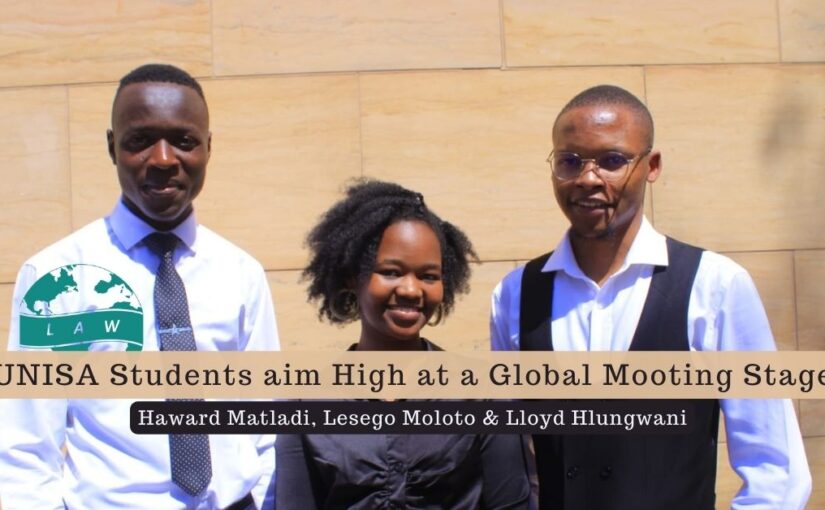UNISA students aim high at a global mooting stage
As UNISA (University of South Africa) students, we are not deterred by the challenges of online learning. We are determined to excel and make our mark on the global stage. Haward Matladi, Lesego Moloto, and Lloyd Hlungwani (from right to left) are LLB students who have participated in two prestigious international moots this year.
The first one was the Children’s Rights Moot Court Competition 2023, co-hosted by Leiden University from the Netherlands and Baker McKenzie, a global law firm. The second one was the Alfred Deakin International Commercial Arbitration (ICA) Moot 2023, hosted by Deakin Law School from Australia.
The Children’s Rights Moot Court Competition 2023 was a virtual event that took place from February to June 2023. It brought together 36 student teams from 19 countries to compete on real, topical, and complex children’s rights matters. The
case for this year focused on safeguarding children’s rights amidst global warming and the responsibility of states to act against climate change. The UNISA team was one of the 16 teams that advanced to the oral rounds, out of more than 400
applicants from around the world. This information was confirmed by Ms. Angela Virgil, the Executive Director of Pro Bono Practice at Baker McKenzie.
The Alfred Deakin ICA Moot 2023 was another virtual event that took place from July to September 2023. It involved 42 student teams from Australia and overseas. Above from being ranked in the top 30 of the competition, the UNISA team was
honorary mentioned for writing and researching one of the best memorials and awarded a Duncan Certificate for the first time in the competition. Our oralists have also been ranked in the top 40 for presenting profound oral arguments out of 105
oralists.
What it takes to be a global Mooter
Preparing for these moots was not easy, especially since we did not have any prior experience in mooting. It required a lot of hard work, dedication, and sleepless nights to acquire legal research, writing, and advocacy skills. We also had to adapt to the diplomatic nature of international law and the different legal systems and conventions that governed the cases.
We were fortunate to have the guidance and support of our coach, Emily Moshodi (a UNISA Alumni and winner of CALS 2022 Public Interest Moot), who constantly reminded us of our capabilities and helped us improve our performance.
Participating in these moots was an enriching experience for us. We learned a lot about international law and arbitration, as well as the importance of championing children’s rights in the face of climate change. The main themes that we researched,
wrote, and advocated include international trade law, contract law, and jurisdiction regarding arbitration.
The relation between South African law and International law: The team was quite aware of the differences between domestic and international law, despite not having yet taken part in a moot competition in a South African setting. Even when the proceedings were the same, the mood was different. In both the Backer McKenzie Moot and the Alfred Deakin Moot, we had to adjust to the diplomatic nature of international law.
This was clear during oral proceedings because both our language of advocacy and the attitudes of fellow counsels had a clear diplomatic face with an air of indulgence. Whereas advocacy is stronger and more authoritative in South African legal proceedings.
Both moots were subject to the laws and regulations outlined in United Nations Conventions like the UN CRC, UNHRC, UNCITRAL Model Law, and CISG. Our comparative analysis is that the Constitution and domestic legislation are the governing laws, according to South African legal precedent, and the conventions and laws from other countries are thought to have a strong precedent in International law.
The challenges and intricacies of participating in moot court competitions
We faced challenges that international law practitioners faced frequently. One was that countries are permitted to reserve certain policies, either in whole or in part. This meant that we had to come up with creative legal means to hold such countries to account as far as our cases were concerned.
The second challenge was that not all international policies are legally binding to member states. Again, these challenges were a reminder of international law’s identity of diplomacy, that countries are not obliged to uphold all policies and international agreements. The same cannot be said about domestic legislation in one country, particularly in South Africa.
The rewards at the end of mooting
Mooting was beneficial to us. We learned about alternative dispute resolutions, international commercial law, and the human rights of children. We have also equipped ourselves with professional character-building skills which include among others, preparation, integrity, teamwork, discipline, time management, and court etiquette.
Conclusion
The most intriguing aspect of mooting is that the problem questions always focus on the most complex legal issues related to current social issues that raise legal questions, developing future legal practitioners who are creative, critical thinkers, and problem solvers.
Therefore, since participating in moot court competitions would be very beneficial for students, we strongly encourage more students to do so. The rewards are incredible, but it takes a lot of effort and commitment. We had the opportunity to interact with experienced legal professionals and fellow students from different countries and cultures.
We are proud to represent UNISA and South Africa on these global platforms, and we hope to inspire more students to take up mooting as a way of enhancing their legal education and career prospects. As a result, we are eager to keep taking part in more moots to better hone and solidify the skills we have learned.
Authors: Haward Matladi, Lesego Moloto & Lloyd Hlungwani
Edited by: Emily Moshodi


Leave a Reply